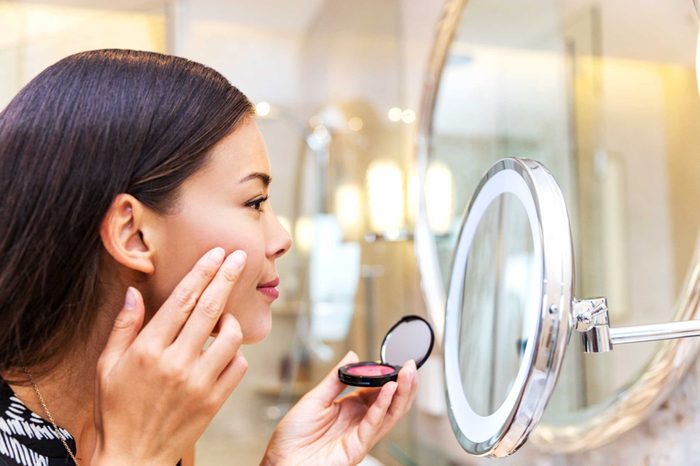What is collagen?
One of the most abundant proteins in the body, collagen, makes up a large part of our skin, hair, and nails, so it’s no wonder the word is big in the beauty world. Collagen is a polypeptide, containing a mixture of amino acids like proline and glycine that are present in all connective tissue, cartilage, and bone. “Your body needs collagen, but you actually make it on your own, so most of us don’t actually need to be adding collagen powder to your foods or taking it as a supplement,” says Nicole Osinga, RD. So is all the excitement surrounding collagen misconstrued? Yes and no. Let’s get to the bottom of it.

Collagen and your body
The human body doesn’t absorb collagen whole, so the idea that taking a supplement can directly promote bone growth and skin or hair health is incorrect, says Osinga. What your body does do is break collagen down in the digestive system into amino acids that the body uses wherever they’re needed, but won’t automatically give you glowing skin. On the plus side, taking a collagen supplement can prompt your body to produce more collagen. Research seems to support this: One study found collagen is beneficial to bones and joints by helping the body’s natural production of collagen by providing a bioavailable source of these amino acids. And the Journal of Arthritis found that some evidence suggests oral collagen may be helpful for osteoarthritis symptoms.

Collagen and skin
Before you take a collagen supplement in hopes of improving your skin, consider this: “There’s actually very limited data, or rigorous scientific studies, on ingestible or oral collagen at this point in time,” says Whitney Bowe, MD, board-certified dermatologist in New York City. “Consequently, the jury is still out as to whether these supplements actually have any meaningful benefit on the skin in women who are already eating a well-balanced diet with a variety of protein sources, such as chicken, fish, eggs, nuts, and yogurt.” Of the data available, a double-blind placebo study found that women who took the peptide form of collagen regularly for eight weeks saw a 20 percent reduction in wrinkles.

Collagen and hair health
As you age, the natural levels of collagen in your body decrease, which is why taking a supplement sounds inviting. According to research, collagen has been shown to support and increase the body’s hair building proteins, which may help prevent hair loss, encourage hair growth, and reduce the appearance of gray hair by supporting the healthy structure of the hair follicle, where pigment is produced. Furthermore, collagen supplements have been shown to be very effective in the treatment of dry brittle hair by supporting healthy moisture levels within the hair. If you want to take collagen for your hair, Skinade is a reputable brand. (Learn more about taking collagen for your hair.)

Collagen, diet, and lifestyle
It’s not enough just to pop a collagen supplement. According to Osinga, vitamin C and collagen must be consumed together, since your body needs vitamin C to produce collagen. Cabbage, red fruits, and carrots all naturally boost collagen production. Along with the body’s natural collagen production declining with age, modern lifestyle factors like stress, poor diet, and gut health imbalances can all decrease the body’s ability to make it.

Types of collagen
There are about 16 types of collagen, but 80 to 90 percent of the collagen in your body is one of these three: type I collagen comprises 90 percent of skin, hair, nails, organs, bone, ligaments, making it the best for skin and beauty, type II collagen is associated with cartilage; while type III collagen applies to fibrous protein in bone, cartilage, dentin, tendon, and other connective tissues.

Sources of collagen
You can get collagen in many forms, according to the Cleveland Clinic: Collagen pills contain up to one gram of collagen per pill and can combine various types of collagen along with vitamin C, which helps your body produce more collagen. There is also collagen powder and liquid, which are great for individuals who don’t want to take pills or have trouble swallowing them. Limited research exists on these, however. If you’re a vegetarian or vegan, there are vegetarian- and vegan-friendly collagen supplements now available that can contain a mix of amino acids, wheat extracts, and vitamins instead of animal byproducts. You can also get dietary sources of collagen from fish, beef, pork, and chicken. Next, read about Vital Proteins collagen creamer and see if it’s the answer to better skin health.
